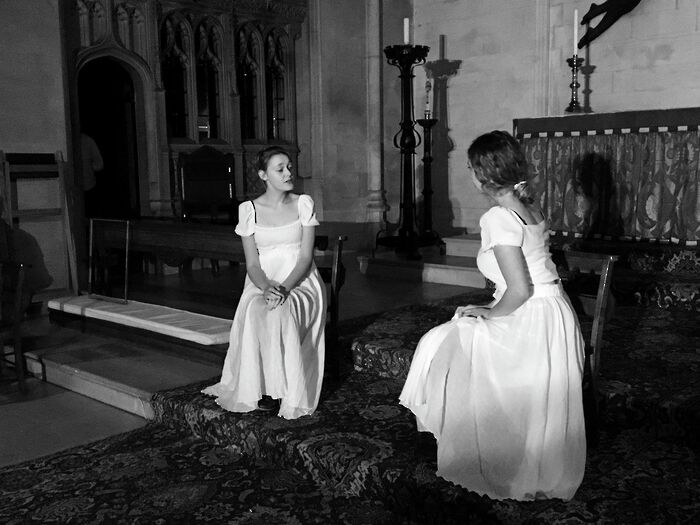The middle class assumption in Cambridge Comedy needs to stop
The idea that both performers and audience are middle class damages not only performances but the range in Cambridge comedy

Class is complicated. So complicated, that most of the time it feels easier to disengage and leave it well alone. This is often a tiring conversation to have. This does not, however, negate its importance. There is a pervasive and dangerous attitude towards class in Cambridge’s comedy scene. It is rooted in an assumption that the creators of comedy - and its audience - are from middle-class backgrounds. The issues this presents serve to alienate non-privileged students in an environment that already ‘others’ them. Class is a complex issue, involving myriad social and economic factors that are constantly in flux. It is thus deeply problematic to assume that everyone at Cambridge has a certain level of privilege and needs to conform to certain stereotypes in the comedy that they write or enjoy.
"It is far easier to nurture confidence when one has opportunities or environments in which creative writing and performing is encouraged"
There is an expectation that a certain universal privilege is shared by all Cambridge students by virtue of attending the university. But our university does not speak to our socioeconomic privilege. As performers, our sketches are rooted in our lived experiences as students who define as non-middle class. We recently performed character comedy in Two by Two, a night of comedy duologues at the ADC. This was a wonderful evening that served to showcase the joy and range of the duologue. The characters we wrote tapped into a non-middle class stereotype that is rarely seen on stage in Cambridge. These women were parodies of the women that we know personally; our mums; our aunts; those friends of your mum you call “Aunty” but she’s just a mate from way back. Parodying them is not punching down. By being Cambridge students, we are not automatically lifted from every other aspect of our lived experiences. It is not some sort of salvation. Lots of the characters we write are odes to our childhoods, the people we grew up with and, to an extent, the people we are. Hyperbolic versions - yes, but cruel and classist? No.
It goes without saying that less privileged performers are already at a disadvantage and can feel one step behind when trying to get involved in comedy. It is far easier to nurture confidence when one has opportunities or environments in which creative writing and performing is encouraged. Extracurricular classes and workshops are wonderful but often come at a fairly hefty price. This means that one might find oneself in Cambridge with fantastic opportunities at one’s fingertips but not the confidence or know-how to go about getting involved. Undeniably, comedy is a pastime that requires a certain level of confidence and a feeling of inexperience or inadequacy can be exacerbated by a scene that wishes to restrict which of our experiences can be voiced. In turn, this sets a dangerous precedent.
"When we got our A-level results and confirmed our UCAS, we didn’t leave behind our heritage"
It is a testament to how ingrained the class problem is in theatre that it is often assumed immediately that performers must fit into a certain bracket to have our place on the stage. Looking to the history of the Cambridge Footlights and its success stories, the prevalence of the middle-class writer/performer becomes apparent. This is not, however, reflective of Cambridge’s diverse class demographic today. Is it so unusual that a performer in Cambridge, or elsewhere might not be from a certain background? And on the note of audience comfort, is our class viewed as so pitiful that it is beyond parody even when in our own hands? When we mock ourselves and the people we grew up with and, in doing so, make a viewer uncomfortable, is it not the lens through which they are viewing our performance that is the problem? When the middle-class experience has been so overwhelmingly normative, there is no space left for alternative narratives.
Comedy that actively deviates from middle-class tropes is some of the most dynamic, entertaining and interesting on TV at the moment. Some sketch shows which focus on the experiences of white, men often fail to hit the mark for those from non-middle class backgrounds because the people in them aren’t people we encounter - the comedy is not always relatable. If This Country were to play on a Cambridge stage would we refuse to see it? Our guess is no, because when creators aren’t from Cambridge, we are able to envisage them having a more nuanced class identity rather than default to lazy assumptions. When we got our A-level results and confirmed our UCAS, we didn’t leave behind our heritage. If anything, being in a place where such prolific privilege is so visible highlighted this disparity to us even more.
The other ways that class problems manifest themselves are arguably less explicit and more insidious. There is, for example, an assumptive conflation between northerness and working class heritage, something which in itself erases the experience of working-class people who happen to live below the Watford gap. We must abandon the notion that a regional accent is innately imbued with socioeconomic ramifications and most importantly the idea that socioeconomic circumstances determines intellect. Cambridge is victim of the exact reversal that Billie Collins observes in northern regional theatre when she discussed the issue in her recent Varsity article. Here in the south, “northern” accents are utilised as comedic tools because, historically, people from the north have often been presented as bumbling, unintelligent figures of fun. Received pronunciation is the norm in Cambridge and regional accents are othered. This discrimination was highlighted in a 2006 study conducted by the University of Aberdeen which found that the three accents the UK population found to be “funniest” were also deemed to be the “least intelligent”. Regionalism is complicated by unsubstantiated intersections of social standing, financial status, cultural awareness and intelligence and this, too, is identifiable in the Cambridge’s comedy scene.
Ultimately, we are bored by the same stereotypes of middle-class life that are trotted out in comedy shows. It is far more interesting to create something different and nuanced, showcasing diversity. The BAME Smokers and Lady Smokers are often the funniest and best received smokers of the term because the eclecticism and range of underrepresented voices make for a far more entertaining show. To dismiss comedy that has non-middle class characteristics speaks to an unwillingness to know, understand or empathise with an underprivileged class narrative. It explicitly disempowers non-privileged writers and performers, illegitimising their experiences. In short, the Cambridge comedy scene must do better.
 News / Trinity exam burglar jailed for 11 months18 July 2025
News / Trinity exam burglar jailed for 11 months18 July 2025 News / Newnham students warned against using ‘secluded or concealed routes’ in evening after student followed16 July 2025
News / Newnham students warned against using ‘secluded or concealed routes’ in evening after student followed16 July 2025 Lifestyle / Seven species of Sidge17 July 2025
Lifestyle / Seven species of Sidge17 July 2025 News / Fenner’s cricket ground suffering ‘dismal decline,’ action group says 17 July 2025
News / Fenner’s cricket ground suffering ‘dismal decline,’ action group says 17 July 2025 Interviews / The Cambridge student hoping to become mayor of Baltimore: Thomas ‘TJ’ Jones16 July 2025
Interviews / The Cambridge student hoping to become mayor of Baltimore: Thomas ‘TJ’ Jones16 July 2025








